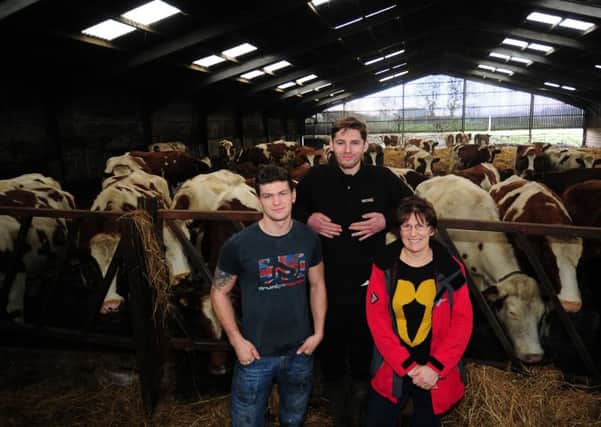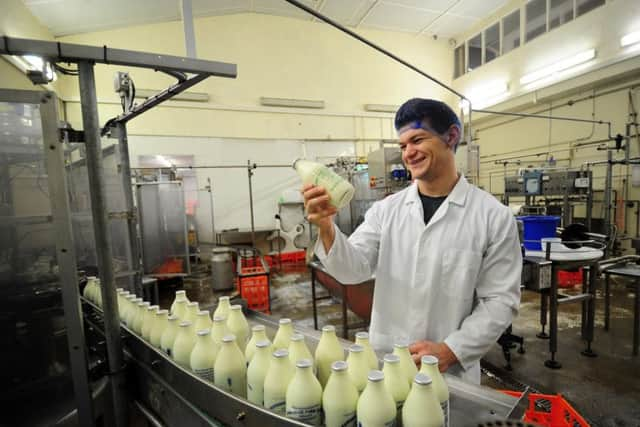Farm of the Week: True to tradition on dairy farm still processing


“For some weird reason I always wanted to be a farmer. My father was a cobbler in Denby Dale and I grew up in Skelmanthorpe. I was always messing about on my Uncle Dudley’s farm where he had eight or nine milk cows, six breeding sows, a couple of hundred hens and turkeys for Christmas.
“All I dreamed about was farming and I started my working life with Fred Bates at Denby Dale when I was 17. He was a well-known grassland farmer with Ayrshire cows. I then worked on another dairy farm for Peter Matthews.
Advertisement
Hide AdAdvertisement
Hide Ad“Betty and I married when I was 21 and she was 19. Betty was a very talented woman and was secretary for the mill owner at Firth’s Mill which was pulled down. After living at Shelley Bank Bottom we bought this place. It cost us £60 an acre and the house was £200. We paid £560 in all and had £1,000 in the bank but we spent the rest trying to make the house liveable as it had only gaslight, a cold tap and an outside toilet. I couldn’t afford to get anyone in to build for me so I went into the building trade and started off our farm by keeping pigs. We had 20 Large White X Landrace sows at one time.”


Beef cows and the acquisition of more land eventually saw Gordon invest in dairy cows after he started to build a cow shed in the mid-1960s.
“Dairy cows were really what I’d wanted since working for Fred and we started with three. We had names for them all at first and Dolly one of our blue and white cows that came out of a Dairy Shorthorn was a favourite.”
Today Gordon takes more a back seat, happy to have what he calls his Last of the Summer Wine morning get-togethers with his pals Brian and Michael who he has achieved so much with, and lets his family get on with what he and Betty began. The herd now runs to 230 Meuse-Rhine-Issel milking cows that produce a herd average of 8,000 litres. The dairy, including the bottling plant, sees them supply milkmen, farm shops, other retailers and local award-winning cheesemaker Danny Lockwood.
Advertisement
Hide AdAdvertisement
Hide AdBarkhouse Farm is also a popular destination venue with its own Dearne Lea Tea Rooms and Dearne Lea Ice Cream. Owned farmland now runs to 280 acres.


Gordon and Betty’s son Michael and daughter Janet Cartwright are the ones who now handle all the day-to-day matters.
“Our unique selling point is that we are still producer-processors,” says Janet. “Everything we produce and process here is sold locally which means that most of our milk is consumed within a radius of around 10 miles whether it is delivered to a doorstep through young milkmen like Jack Hayes who is following in his father’s footsteps or into farm shops such as Farmer Copley’s in Pontefract or Blacker Hall Farm just down the road.
“We believe that having dairy cows out grazing fields when it is appropriate in spring and summer is the right way to run a dairy farm and that’s why we have joined a scheme called The Pasture Promise that ensures the public that our cows live a natural life rather than being kept inside all year round. Cows love being out on grass, you’ve only to see how they react when they are first let out in spring to see how much it means to them. We don’t believe in denying them that happiness just for the sake of a few more litres and we are really pleased that both our cows and our dairy carry the Red Tractor logo as a sign of our commitment to farming the right way.
Advertisement
Hide AdAdvertisement
Hide Ad“The move to pedigree Meuse-Rhine-Issel cows 18 years ago came after Michael became tired of problems with the Holstein Friesians having bad feet. He was spending nearly all week on them so he looked for a better all round cow. The MRIs have about the same production level of the Holstein Friesian but they are far better in their feet and legs and are also high in protein which makes their milk exactly what Danny and Carole (Lockwood) need for their Barncliffe Brie cheese.”
Milk supplied to the dairy at Barkhouse Farm also comes from one other source Stuart Waterhouse’s Shaley Farm at Scholes near Holmfirth where he also has Meuse-Rhine-Issel. Stuart and Michael have both been over to Holland several times sourcing the right cows but now have sufficient to provide their own replacements.
Ice cream production started 22 years ago when Janet looked at how the farm could diversify.
“When we started it soon became clear that our best bet would be to sell the ice cream direct and as a result we then opened a shop selling cakes I used to bake. The next step was to open the tearoom. It was a gradual evolution from sandwiches and toasties to where we have been now for the past dozen years or so.”
Advertisement
Hide AdAdvertisement
Hide AdBeing producer-processors does not mean that Barkhouse Farm has been completely shielded from the milk price slump that has hit dairy farmers who supply the large-scale dairy companies.
“The milkmen who buy from us have not been able to put up their prices for much of the past six or seven years as they continue to fight the battle with supermarket milk prices.”
What is particularly refreshing about life at Barkhouse Farm is that it is a family business that has stayed loyal to its roots. While it has developed, it has also stuck true to tradition. Dairy cows still graze the fields, milkmen still deliver their milk in glass bottles, their ice cream and tearooms are local businesses that employ local people and the family is still very much at the forefront.